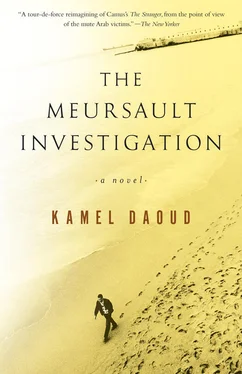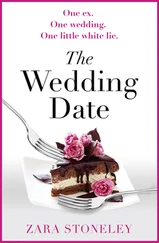Night has fallen. Look at this incredible city, doesn’t it present a magnificent counterpoint? I think something immense, something infinite is required to balance out our human condition. I love Oran at night, despite the proliferation of rats and of all these dirty, unhealthy buildings that are constantly getting repainted; at this hour, it seems that people are entitled to something more than their routine.
Will you come tomorrow?
I admire your patience, cunning pilgrim that you are — I think I’m really starting to like you! For once, I have a chance to talk about this story … Picture an old whore dazed by an excess of men; she and this story of mine share some features. It’s like a text written on parchment and scattered all over the world; it’s brittle, patched up, no longer recognizable, infinitely rehashed — and yet look at you, sitting beside me and hoping for something new, something never heard before. This story doesn’t suit your quest for purity, I swear to you. If you want to light your way, you should look for a woman, not a dead man.
Shall we order the same wine as yesterday? I love its rough edges, its freshness. The other day, a wine producer was telling me his troubles. It’s impossible to find workers, because the activity is considered haram , illicit. Even the country’s banks are piling on and refusing him credit! Ha, ha! I’ve always wondered, what’s the reason for this complicated relationship with wine? Why is it treated as though it’s of the devil, when it’s supposed to be flowing profusely in Paradise? Why is it forbidden down here and promised up there? Drunken driving. Maybe God doesn’t want humanity to drink while it’s driving the universe to its place, holding on to the steering wheel of heaven … Yes, yes, I agree, the argument’s a bit muddled. As you’re starting to realize, I like to ramble.
You’re here to find a corpse and write your book. But you should be aware that even though I know the story — all too well — I know virtually nothing about its geography. Algiers is only a shadow in my mind. I almost never go there. Sometimes I see it on television, looking like an outdated actress left over from the days of revolutionary theater. So there’s no geography in this story. Generally speaking, it takes place in three settings of national importance: the city, whether that one or another one; the mountains, where you take refuge when you’re attacked or you want to make war; and the village, which is for each and every one of us the ancestral home. Everybody wants a village wife and a big-city whore. Just by looking out the windows of this bar, I can sort the local humans for you according to one of those three addresses. And so when Musa went away into the mountains to speak to God about eternity, Mama and I left the city and went back to the village. That’s all. There was nothing more until I learned to read and the little scrap of newspaper Mama kept between her breasts for so long — the one that reported the murder of Musa/Zujj — suddenly became a book with a name. Just think, we’re talking about one of the most-read books in the world. My brother might have been famous if your author had merely deigned to give him a name. H’med or Kaddour or Hammou, just a name, damn it! Mama could have had a martyr’s widow’s pension, and I could have had a known, recognized brother, a brother I could have prided myself on. But no, he didn’t name him, because if he had, my brother would have caused the murderer a problem with his conscience: You can’t easily kill a man when he has a given name.
Let’s go back. It’s always a good thing to go back and review the basics. A Frenchman kills an Arab who’s lying on a deserted beach. It’s two o’clock in the afternoon on a summer day in 1942. Five gunshots, followed by a trial. The killer’s condemned to death for having buried his mother badly and spoken of her with too much indifference. Technically, the killing itself is due either to the sun or to pure idleness. A pimp named Raymond is angry with a whore and asks your hero to write her a threatening letter, which he does. Things go downhill, and then the story seems to resolve itself in a murder. The Arab is killed because the murderer thinks he wants to avenge the prostitute, or maybe because he has the insolence to take a siesta. You find my summary of your book unsettling, eh? But it’s the naked truth. All the rest is nothing but embellishments, the products of your writer’s genius. Afterward, nobody bothers about the Arab, his family, or his people. When the murderer leaves prison, he writes a book that becomes famous, in which he recounts how he stood up to God, a priest, and the absurd. You can turn that story in all directions, it doesn’t hold up. It’s the story of a crime, but the Arab isn’t even killed in it — well, he is killed, but barely, delicately, with the fingertips, as it were. He’s the second most important character in the book, but he has no name, no face, no words. Does that make any sense to you, educated man that you are? The story’s absurd! It’s a blatant lie. Have another glass, it’s on me. Your Meursault doesn’t describe a world in his book, he describes the end of a world. A world where property is useless, marriage practically unnecessary, and weddings halfhearted, where it’s as though people are already sitting on their luggage, empty, superficial, holding on to their sick and fetid dogs, incapable of forming more than two sentences or pronouncing four words in a row. Robots! Yes, that’s the word, it wasn’t coming to me. I remember that little woman, a Frenchwoman, the one the writer-killer describes so well. He observes her one day in a restaurant. Jerky movements, shining eyes, tics, anxiety about the bill, robot gestures. I also remember the pendulum clock that was right in the middle of Hadjout, and I think it’s that Frenchwoman’s twin. The thing stopped for good a few years before Independence, it seems to me.
So the mystery struck me as more and more unfathomable. See, I’ve got a mother and a murder on my back too. Me too. It’s fate. I too have killed, in accordance with the desires of this earth, one day when I had nothing to do. Ah! I swore to myself so many times I’d never revisit that episode, but every move I make either dramatizes it or evokes it involuntarily. I was waiting for a little nosy-nose like yourself to come along, someone I could finally tell this tale to …
Inside my head, the map of the world is a triangle. At the top, in Bab-el-Oued, there’s the house where Musa was born. Lower down, overlooking the Algiers coast, there’s the place with no address where the murderer never came into the world. And finally, even lower, there’s the beach. The beach, yes indeed! These days it doesn’t exist anymore, or it’s slowly shifted itself elsewhere. According to witnesses, there was a time when you could still spot the little wooden bungalow at the far end of the beach. The back of the house rested against the rocks, and the pilings that held it up in front went straight down into the water. The commonness of the place struck me when I went there with Mama that autumn, the autumn after the crime. I’ve already described that scene to you, right? Me and Mama on the seashore, me ordered to stay back, and Mama facing the waves and cursing them? I have that feeling every time I get close to the sea. A bit of terror at first, an accelerated heartbeat, followed rather quickly by disappointment. It was as if the place was simply too confined! It seemed like trying to squeeze the Iliad into a narrow space on the street, between a grocery store and a barber shop. Yes, the scene of the crime was in fact a terrible letdown. In my view, my brother Musa’s story needs the entire earth! Ever since that day, I’ve cultivated a wild hypothesis: Musa wasn’t killed on that famous Algiers beach! There must be another, hidden place, a setting that was disappeared. That would explain everything, all at once! Why the murderer was so relaxed after being sentenced to death and even after his execution, why my brother was never found, and why the court preferred judging a man who didn’t weep over his mother’s death to judging a man who killed an Arab.
Читать дальше












